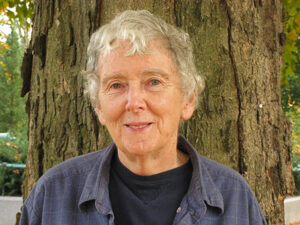By Peg Lopata, Contributing writer

Photo/submitted
Somerville – Judy Norris, 81, is a Jill-of-all-trades. She’s worn many different hats these past 13 years as a more than full-time volunteer for the Cambridge Women’s Center (CWC). She’s done volunteer, financial, and program management; fundraising, including writing grant applications; staff oversight and, is currently chairperson of the board of the center. Since 1971 she has been a key player in the survival of the CWC.
The work Norris does at the CWC keeps this sanctuary, an unassuming home-like building near Central Square, Cambridge, an important community support.
She explained, “At the Cambridge Women’s Center people with extremely limited resources have somewhere they can spend time, even all day into the evening, five days a week, and five hours on Saturday. Here they can feel accepted, cared about. They can get food, use computers, go to support groups, workshops—all for free.”
The CWC helps women who are dealing with hunger, homelessness, poverty, mental health issues, domestic violence, and other kinds of trauma.
“I feel we are all in it together, working to create a safe environment that is very inclusive and supportive,” Norris said. “We’re building a unique community where differences are accepted and women feel empowered and inspired to stand up for themselves and others.”
This is very satisfying work for Norris, as she noted, “I’m helping women find a little peace and stability in their tumultuous lives. It’s great to be a part of that.”
Supporting women has been a part of Norris’s life for many years that began with women meeting in the basement of a Cambridge coffee house. The meeting was run by a local feminist group, Bread and Roses.
“We shared with one another, talking about our lives and then we became a conscious-raising group and met together for many months,” she said.
Consciousness-raising groups were part of the grassroots feminism movement in the 1960s and 70s. These groups were formed to help women become aware of the ways to fight oppression and become agents of their own lives.
“It was huge for me. As a new mom I was overcome with stress and insecurity about parenting. I learned in this group that we women were all going through challenges that had to do with being women,” said Norris.
Being at the forefront of the women’s movement has informed much of what Norris has done and continues to do with her own life. Norris saw that women’s opportunities were very limited when she was a young woman. For example, there were only certain types of jobs offered to women.
“I am thrilled now when I see women bus drivers, doctors, veterinarians, police officers, and letter carriers. Women can work on construction crews, be plumbers, electricians, newscasters, politicians, lawyers and more. I feel this has opened up so much for women,” she noted.
The women’s movement changed many women’s lives and affected all women, including Norris. As a women’s advocate, Norris was heartened when the U.S. Supreme Court banned sex-segregated ‘help wanted’ advertising.
Clearly, championing women and their rights is more than just armchair advocacy for Norris. Her work at the CWC demonstrates this. She has dedicated her life to supporting women by showing them they are valued. Norris knows feeling valued is most difficult for women dealing with very unstable lives. She hopes that the work she does at the CWC will reach the larger community with the message that we need to be more respectful of women.
Not surprisingly, she’s inspired by those women in our world who she believes have helped foster greater respect for women, such as Ellen DeGeneres and Whoopi Goldberg. Closer to home she’s inspired by Casey Fox, a women’s center trauma group leader. Though modest, it’s likely others are inspired by Norris herself.
“I’ve put my all into doing what I can to keep the CWC alive, helping create and sustain an inclusive, supportive environment for about 50 years,” she said.












